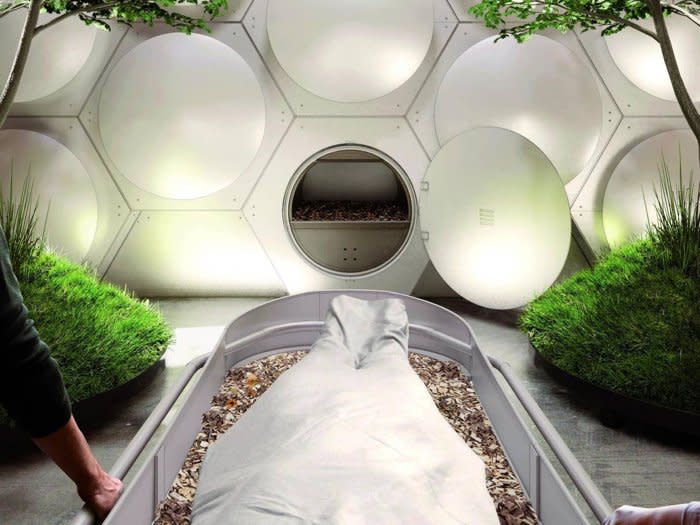World’s first ‘human composting’ site to open in 2021 to turn people into soil

Most of us are fairly squeamish about what happens to our bodies after death - hence perhaps the Western fashion for a hygienic cremation.
But Americans will in 2021 be able to try a new way of disposing of their dead… human composting.
The Recompose facility turns human bodies into soil, using hexagonal ‘Recomposition’ vessels.
The facility is set to open in Seattle, Washington, in 2021, and company founder Katrina Spade describes it as a ‘death care revolution’
READ MORE
We SHOULD be scared of climate change, says senior scientist
Orangutan saved by vets after being found blind and riddled with airgun pellets
How bad is the WhatsApp surveillance attack
Transplant patient’s DNA is replaced with his donor’s
Bodies are placed inside the vessels, covered in wood chips and allowed to rot in a process
Recompose describes as ‘natural organic reduction’.
The company says, ‘Bodies are covered with wood chips and aerated, providing the perfect environment for naturally occurring microbes and beneficial bacteria.
‘Over the span of about 30 days, the body is fully transformed, creating soil which can then be used to grow new life.’
A body turns into around a square metre of soil, some or all of which families are encouraged to take home, ScienceAlert reports.
British company Resomation has discussed the idea of ‘water cremation’ with British councils.
In a water cremation, a strong alkali, potassium hydroxide, is used to dissolve bodies.
The company claims that it is more environmentally friendly than burning bodies.
Resomation says, ‘Giving people a new choice at the end of life, water cremation is a gentler, environmentally friendly option that allows a natural process using water instead of flames.
According to company founder Sandy Sullivan the waste water does not contain DNA from the dead person.
His website explains: ‘The sterile liquid effluent is safely returned to the water cycle free from any traces of DNA.’

 Yahoo Movies
Yahoo Movies 